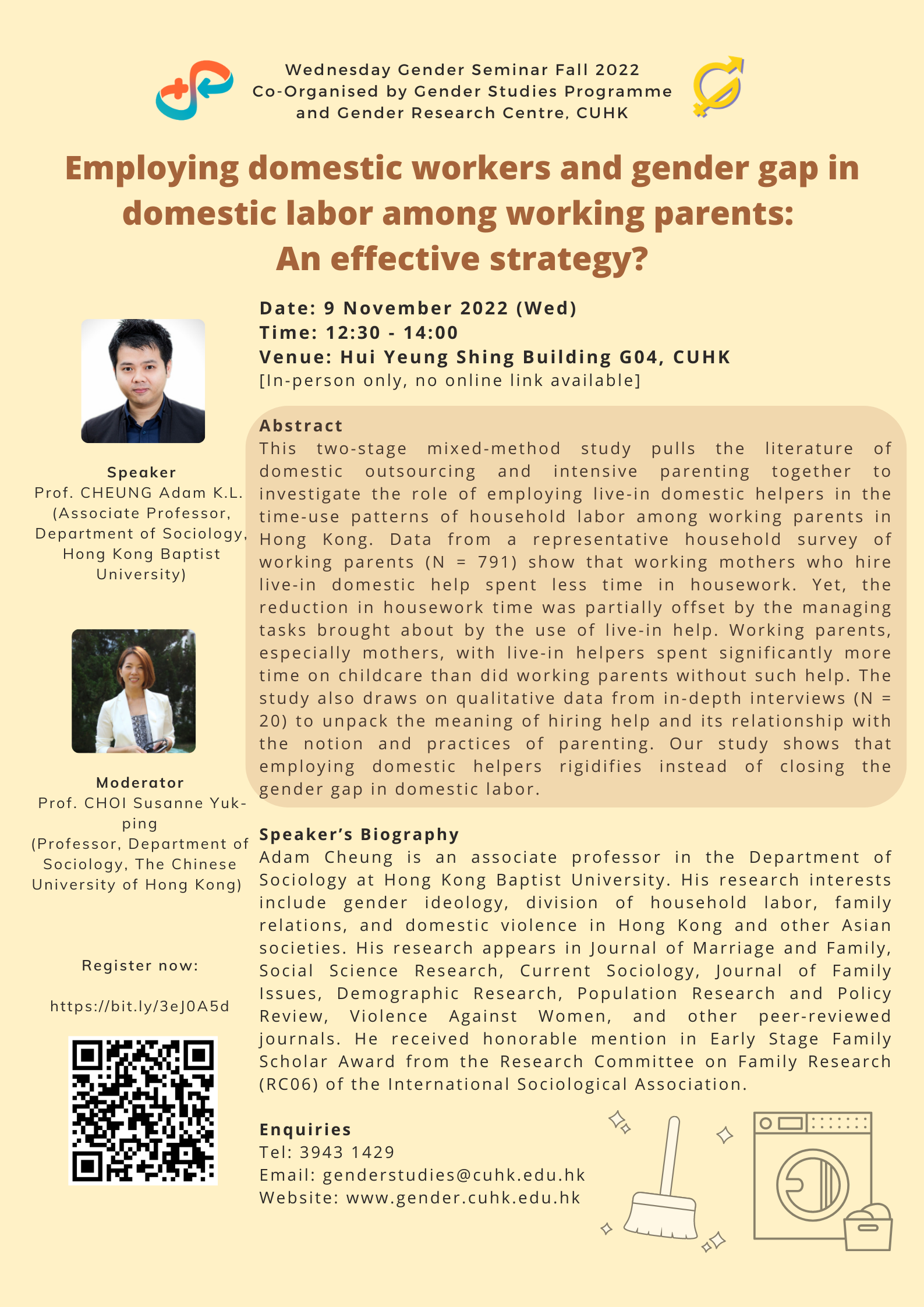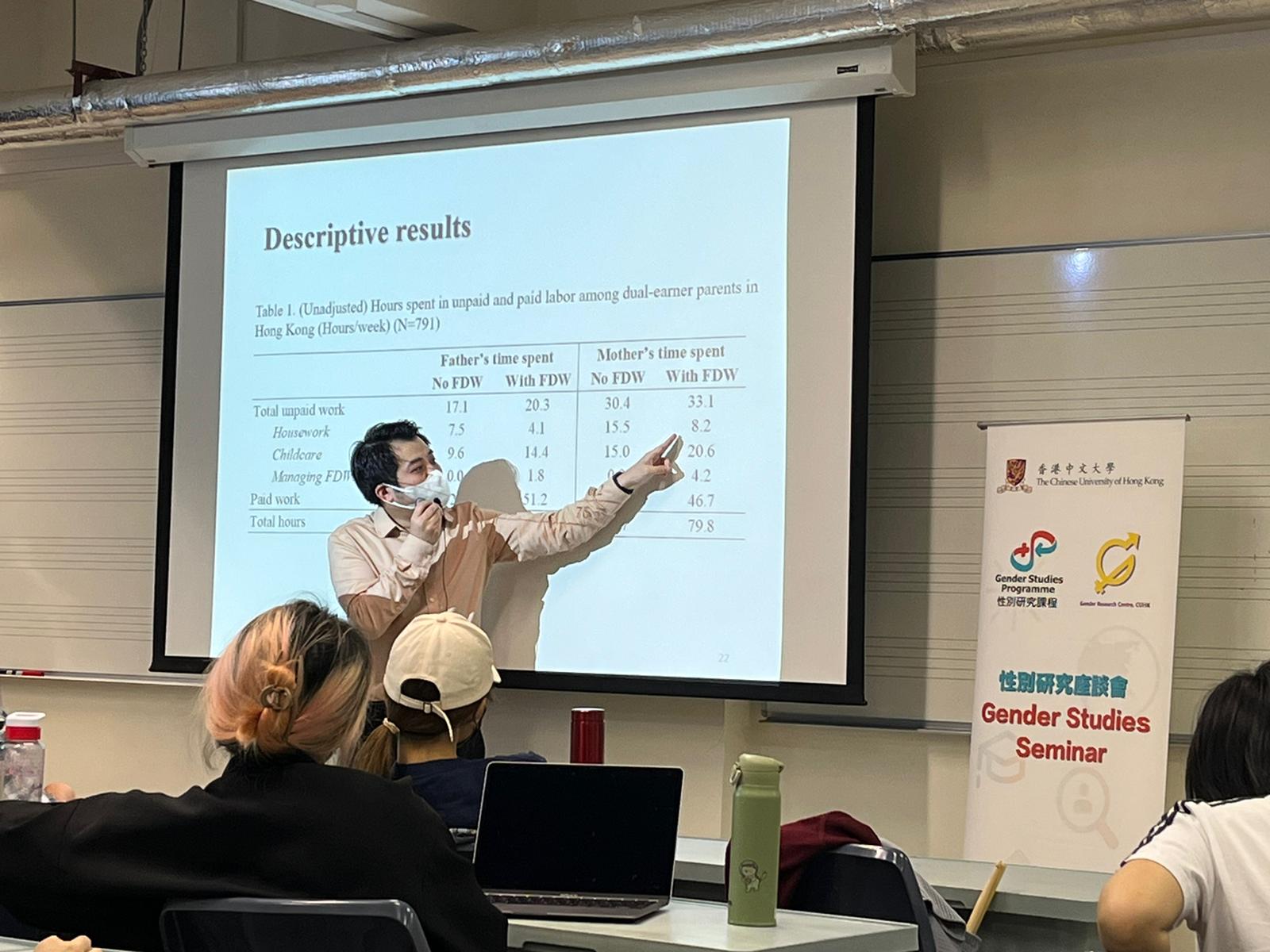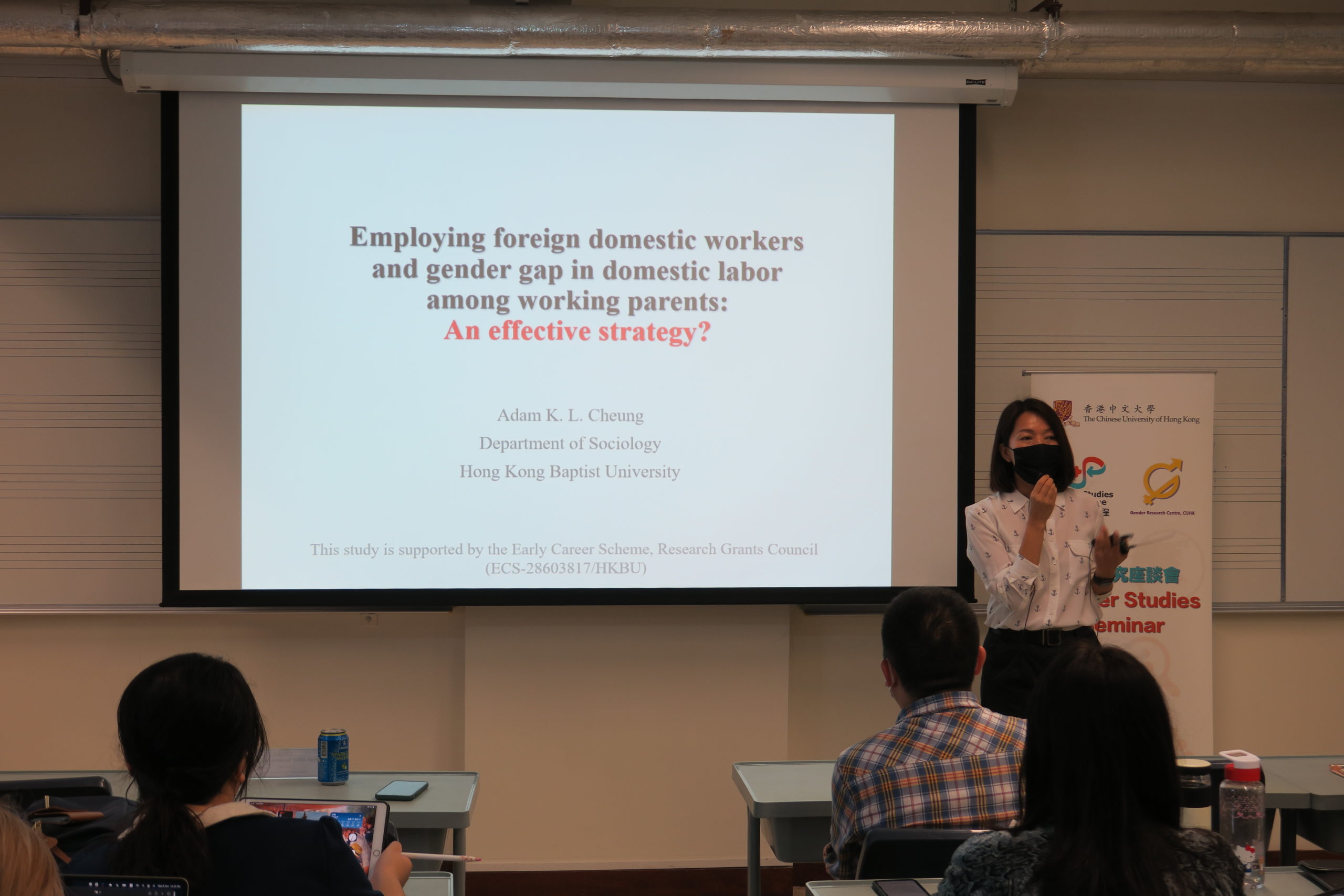At last Wednesday seminar, Prof. Adam Cheung presented his research on how live-in foreign domestic workers (FDW) help reduce unpaid domestic labor for dual-earning parents in Hong Kong.
Consisting of 4-5% of HK population, FDWs play an unignorable role in HK society, and around 1/5 married population in HK live with a domestic worker. While research on FDWs’ living/working conditions flourished, limited studies have investigated the changes they brought to the employer families. Prof. Cheung therefore shifted the research focus to the hiring families. He also pointed out that, the well-established time-saving effect of the labor outsourcing nature of hiring domestic workers might not be applied to Hong Kong context for two reasons. Firstly, live-in domestic workers could generate more management tasks for the employers. Secondly, the prevailing intensive-parenting beliefs might hinder the delegation of all childcare tasks to the domestic workers, that is the delegation-involvement paradox. Instead, the time saved in housework might be taken up by the parents to do more childcare/management tasks, producing a time-displacement effect. As the emotional and communal nature of proposed new tasks, a gendered labor pattern might be expected.
Prof. Cheung’s study used a two-stage mixed-method design. The quantitative data of a representative sample of working parents (N=791, Nwith live-in help=265) suggested a time-displacement effect of live-in domestic help. Although paid help significantly reduced the time parents spent on housework, parents with live-in domestic workers spent around 3 hours more per week in unpaid labor than did those without paid help. The increased labor involved managing the domestic worker and childcare. The following in-depth interviews (N = 20) revealed parents’ subjective perception of the use of live-in domestic help as a strategy to achieve better parenting. In terms of gendered labor division, with a live-in helper, working mothers saved more time in housework but also had a larger burden of management and childcare than working fathers. No effect of hiring live-in help on diminishing gender inequality was founded, and working mothers had a higher total labor hours than fathers in both conditions.
Written by: TANG Xiaolei
Employing foreign domestic workers and gender gap in domestic labor among working parents: An Effective Strategy
The use of live-in domestic labor is popular among dual-earning parents. Around one-third of dual-earning parents in Hong Kong currently hire live-in domestic helpers. This study provides a critical examination of the time-saving hypothesis from the domestic outsourcing literature on the roles of hiring live-in help for household labor and situates the time-saving effect in the literature of intensive parenting. The research uses mixed method, analyzes quantitative data from a representative household survey to investigate the association between employing live-in domestic help and time spent by the working fathers and mothers on housework, childcare, and tasks related to managing domestic helpers, and also analyzes qualitative data from in-depth interviews of first-hand experiences about the role of hiring help in household labor to unpack the meaning of hiring help and its relationship with the notion and practices of parenting.
The findings suggest that the use of live-in domestic help is a specialization strategy to strive for perfection in parenting for parents. By outsourcing household chores and more routinized childcare tasks to the helpers, working parents, especially mothers, can focus on emotional bonding and tasks conducive to the development of their children. Working parents hiring live-in domestic work spent significantly fewer hours in housework, however, the reduced time in housework is totally replaced by the increased time on childcare and managing the helper. The time-saving effect of using domestic help is stronger for women than for men but it does not reduce gender inequality, mothers took up most of the new role of managing domestic helpers to deal with both household chores and routinized childcare work. Parenting strategies, though, are more intensified on the part of the mothers. The gender gap still exists.
Written by: ZHANG Mengya
Although there has been a lot of research on FDWs (Foreign Domestic Workers) in Hong Kong recently, Professor Cheung’s research is very refreshing. Unlike other places of the world, Hong Kong has a tradition of employing live-in FDWs rather than flexible helpers for domestic outsourcing, which means that the former has a higher threshold, is more inflexible, and requires the employer’s family to spend more time negotiating with and managing. Also, Hong Kong is a well-known city for its culture of intensive parenting. Many Hong Kong parents will consider hiring FDWs as a strategy to practice their intensive parenting.
Based on domestic outsourcing and intensive parenting, Professor Cheung has studied the time-use patterns between Hong Kong families with and without FDWS through a mixed-method of quantitative and qualitative research and has come up with conclusions that are different from previous research. He found that the time-saving effects of domestic outsourcing are overestimated, and the time-displacement fits Hong Kong’s condition more. In Hong Kong, hiring FDWS does save parents (mainly mothers) some time in housework, but the time of child-care and managing helper increase. Due to the expectation of intensive mothering, these two tasks are still gendered and mothers always do more, which indicates hiring help cannot enhance gender equality.
In my opinion, Professor Cheung’s research perspective and findings are very inspiring. As someone interested in domestic outsourcing in mainland China, I have only focused on work-family time conflicts in the family, but not aware of the chores-childcare conflicts (especially for mothers). In addition, Professor Cheung also emphasizes the importance of the ideology of intensive parenting. In mainland China, the role of FDWs is usually taken by grandparents. However, after the abolition of extra-curricular classes, will parents’ anxiety turn into a form of intensive parenting and prompt them to hire young educated helpers to do the child-care work? This is still underexplored and deserves our attention.
All in all, I really enjoyed this seminar and it gave me a lot of inspiration for my research.
Written by: ZHANG Xunyue





A
A
A
Contact Us